Shia LaBeouf: Based on NeemTime research
Personal Details/Who is Shia LaBeouf
Shia LaBeouf is an American actor, filmmaker, and performance artist known for his intense screen presence and unconventional creative choices.
He was born on June 11, 1986, in Los Angeles, California, and began his career as a child actor before transitioning into mainstream Hollywood.
LaBeouf rose to early fame through his role as Louis Stevens on the Disney Channel series Even Stevens, for which he won a Daytime Emmy Award.
He is of mixed heritage, with a Jewish mother and a Cajun French father, and often references this cultural blend in his work.
His breakout film role came in 2007 with the thriller Disturbia and the blockbuster Transformers, launching him to international stardom.
Known for his raw, emotionally charged performances, LaBeouf has carved a path distinct from typical Hollywood leading men.
He often collaborates with auteurs and independent filmmakers, reflecting his interest in boundary-pushing cinema.
LaBeouf has publicly grappled with personal and legal controversies, which have influenced both his public image and his art.
In addition to acting, he is known for experimental performance art projects that blur the lines between film, identity, and social commentary.
Shia LaBeouf remains a polarizing but undeniably influential figure in modern American cinema.
Background/Early Life Highlights of Shia LaBeouf
Shia was raised in a working-class family in Echo Park, Los Angeles, where he experienced a turbulent upbringing marked by poverty and family instability.
His father, Jeffrey LaBeouf, was a Vietnam War veteran and performer, while his mother, Shayna Saide, was a visual artist and dancer.
LaBeouf has described his early life as chaotic, with episodes of domestic conflict and frequent financial struggles.
To help support his family, he began performing stand-up comedy at local clubs when he was just 10 years old.
He found his first agent by looking in the Yellow Pages and impersonating his own manager over the phone.
Shia was largely self-educated, attending a performing arts school and later supplementing his education with on-set experience.
His complex relationship with his father heavily inspired the semi-autobiographical film Honey Boy, which he wrote and starred in.
Despite his fame, he has often returned to the themes of childhood trauma, addiction, and self-discovery in his work.
He credits his early comedic instincts as both a survival mechanism and a foundation for his later acting versatility.
LaBeouf’s resilience and early hustle earned him a reputation as a self-made talent in the entertainment industry.
Career Highlights of Shia LaBeouf
LaBeouf gained national recognition for Even Stevens (2000–2003), earning a Daytime Emmy Award and marking his entrance into Hollywood.
His breakout film performance in Holes (2003) showcased his ability to carry a major feature, leading to bigger roles.
He achieved global fame with Transformers (2007), which spawned two sequels and cemented his status as a bankable action star.
Shia worked with director Steven Spielberg on multiple occasions, including Indiana Jones and the Kingdom of the Crystal Skull (2008).
In Lawless (2012) and Fury (2014), he impressed critics with gritty, grounded performances that contrasted with his blockbuster past.
He starred in Lars von Trier’s controversial Nymphomaniac (2013), signaling a shift toward more provocative, art-house fare.
LaBeouf received critical acclaim for Honey Boy (2019), playing a version of his own father in the deeply personal film he also wrote.
He earned praise for his performance in The Peanut Butter Falcon (2019), a heartfelt indie film that resonated with audiences and critics.
His work in American Honey (2016) and other indie projects showed a growing interest in stories about marginalization and freedom.
While often controversial, his career has spanned genres and challenged the expectations of what a mainstream actor can be.
Other Work Highlights of Shia LaBeouf
Shia has engaged in multiple performance art collaborations with artists like Nastja Säde Rönkkö and Luke Turner under the project banner #IAMSORRY.
One of his most famous installations was “#ALLMYMOVIES,” where he watched all his films consecutively for 72 hours in a public theater.
In “He Will Not Divide Us,” he invited the public to repeat the phrase on livestream as a political statement during Donald Trump’s presidency.
LaBeouf’s art has been exhibited in museums and institutions, blending cinema, performance, and audience participation.
He has directed several short films and music videos, including projects for artists like Kid Cudi and Alma Har’el.
His short film Howard Cantour.com (2012) stirred controversy for plagiarizing a Daniel Clowes comic, a misstep he later publicly apologized for.
He is also a published poet and writer, having shared deeply personal prose through both his performance pieces and independent zines.
LaBeouf uses his artistic work as a form of therapy and self-exploration, often revealing painful truths about his own life.
His multimedia output has been polarizing but also praised for its vulnerability and originality in the realm of celebrity-driven art.
Through both his acting and his art, Shia has positioned himself as a cultural provocateur unafraid to confront societal norms.
Family Members/Personal Life of Shia LaBeouf
Shia’s parents divorced when he was young, and he has spoken about growing up with limited resources and a fractured family structure.
His relationship with his father, whom he portrayed in Honey Boy, has been described as loving but deeply traumatic and complex.
LaBeouf was briefly married to actress Mia Goth, with whom he reportedly reconciled in recent years; they welcomed a daughter in 2022.
His mother, Shayna Saide, has been a constant figure in his life and was supportive of his career from an early age.
Shia has struggled with substance abuse and mental health issues, many of which he has openly discussed in interviews and projects.
In 2020, he entered rehab for addiction and emotional health issues following a string of legal and personal challenges.
His faith has evolved over time, including explorations of Christianity during the filming of Padre Pio and his Jewish roots in his youth.
LaBeouf prefers to live a reclusive lifestyle and is often seen in low-profile settings away from Hollywood glamour.
His romantic life has been marked by on-again, off-again relationships and public controversies, though he appears more grounded since becoming a father.
Despite a tumultuous personal life, LaBeouf continues to seek redemption through his art, family connections, and spiritual journey.
Shia LaBeouf Shirtless
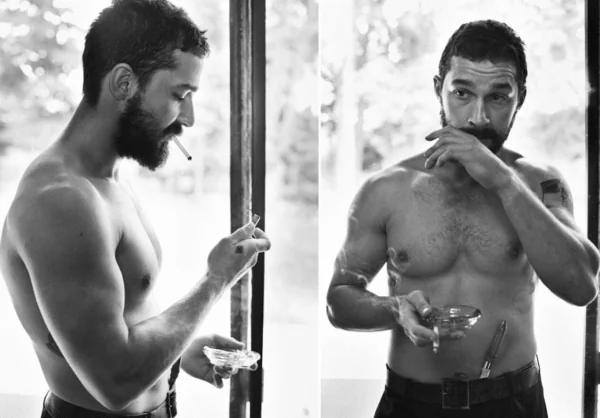
Shia LaBeouf Shirtless 5
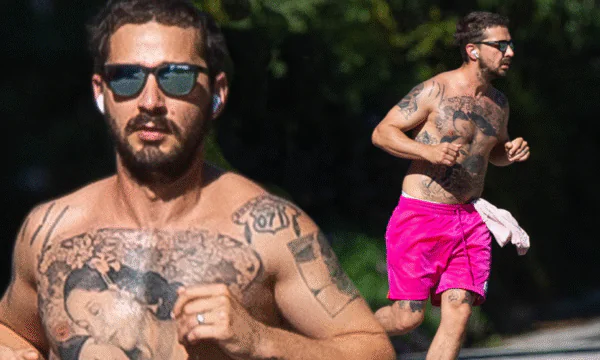
Shia LaBeouf Shirtless 4
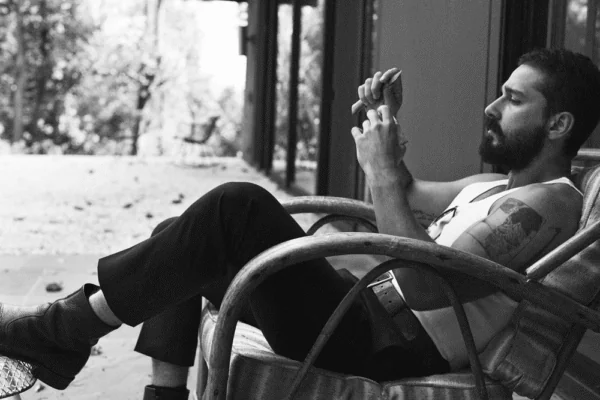
Shia LaBeouf Shirtless 3
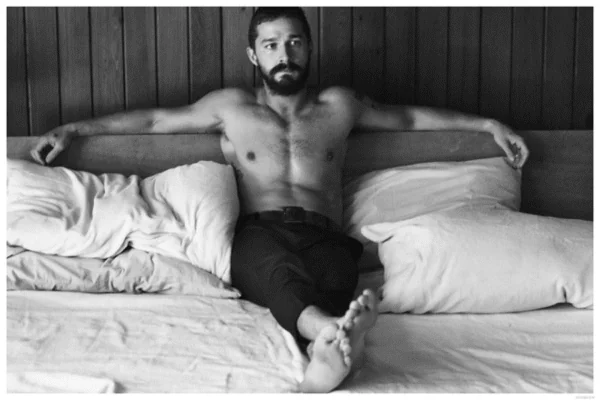
Shia LaBeouf Shirtless 2
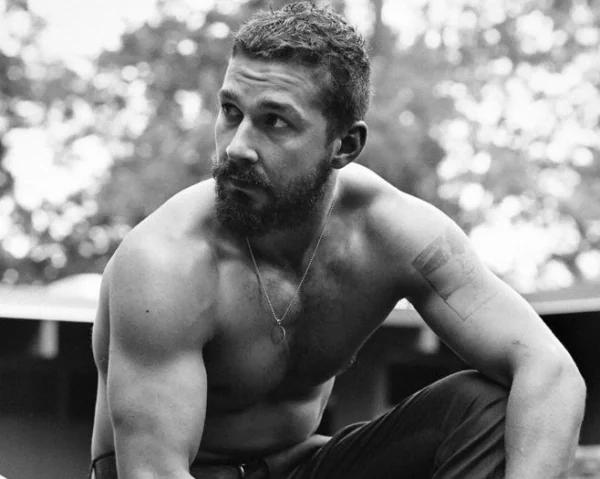
Shia LaBeouf Shirtless
Surprising/Unknown Facts/Trivia of Shia LaBeouf
Shia LaBeouf got his start in entertainment by performing stand-up comedy in coffee shops at the age of ten to help support his family.
He found his first agent by pretending to be his own manager on a phone call, showcasing his early ambition and wit.
Despite his mainstream fame, LaBeouf has never owned a smartphone, often choosing to stay disconnected from social media and the digital world.
He once got a matching tattoo with his Fury co-stars to commemorate the intense filming experience of the World War II drama.
LaBeouf has a full chest tattoo of the word “Creeper” for his role in The Tax Collector (2020), which he reportedly insisted be real.
He studied clowning and mask performance at a French theater school to prepare for more experimental acting roles.
LaBeouf was once arrested at a Broadway play for causing a public disturbance, which he later described as a major wake-up call.
His short film Howard Cantour.com was accused of plagiarism, leading him to apologize via skywriting over Los Angeles.
He once hitchhiked across America for a performance art project, engaging strangers in unscripted interactions as part of an artistic experiment.
Shia’s tooth was removed for authenticity during the filming of Fury, demonstrating his extreme commitment to his craft.
Height/Body/How to Get Body Like Shia LaBeouf
Shia LaBeouf stands at approximately 5 feet 9 inches (175 cm) and has a lean, athletic frame that adapts to each film role.
His physical transformation for Fury included military boot camp training, weightlifting, and real combat simulations.
For The Peanut Butter Falcon, he relied on outdoor activities and a minimalist lifestyle to reflect his character’s rugged nature.
His routine includes high-repetition weight training and functional movement workouts that prioritize strength and realism over aesthetics.
LaBeouf often alters his diet to suit each role, ranging from calorie-heavy bulk diets to stripped-down, protein-rich plans.
He practices movement-based martial arts and boxing as a form of both physical preparation and mental discipline.
For The Tax Collector, he adopted a bodybuilder-style workout plan that focused on hypertrophy and endurance.
Shia emphasizes the importance of becoming the character physically, often changing his posture and gait to match the emotional state of the role.
He avoids overtraining by prioritizing recovery, stretching, and basic calisthenics between film shoots.
To build a physique like Shia’s, one would need to combine acting-focused physical training, method discipline, and role-specific transformation techniques.
Interview Quotes of Shia LaBeouf (Source/Year)
“I don’t think I’ve ever been truly loved for me. I think I’m loved for what I represent.” – The Hollywood Reporter, 2019
“Pain is the oxygen of transformation.” – Variety, 2020
“My hustle has always been strong. I don’t know another way.” – GQ, 2014
“The only thing my father gave me that was of any value was pain. And you can’t get pain for free.” – The New York Times, 2019
“I used to think my life was like a movie. Now I want it to be real.” – The Guardian, 2020
“Art is not safe. It’s meant to disturb, awaken, or provoke.” – Dazed, 2017
“I’m not trying to impress anybody anymore. I’m just trying to stay honest.” – Esquire, 2018
“Rehabilitation doesn’t just mean not drinking. It means a total lifestyle shift.” – IndieWire, 2020
“The most honest work I’ve done came from the most painful parts of my life.” – NPR, 2019
“My goal is not redemption. My goal is truth.” – Interview Magazine, 2021
TV/Movie Quotes of Shia LaBeouf (Source/Year)
“No, no, no, no, no!” – Transformers, 2007
“Sometimes I think about cutting myself. I’m just being honest.” – Honey Boy, 2019
“We’re not bad people. We just come from a bad place.” – The Peanut Butter Falcon, 2019
“Do it! Just do it! Don’t let your dreams be dreams.” – Motivational Video, 2015 (viral green screen project)
“You are not your past. You are the love you give.” – Honey Boy, 2019
“War is the great maker of men.” – Fury, 2014
“I’m your tax collector. I’m your plug. I’m your priest.” – The Tax Collector, 2020
“I just want to live my life, man.” – American Honey, 2016
“My whole life is about saving people.” – Man Down, 2015
“You’re either a warrior or you’re not.” – Fury, 2014
Why We Love Shia LaBeouf
Shia LaBeouf is one of the few actors unafraid to put his own life, flaws, and trauma on full display through his art.
His performances are raw and emotionally charged, reflecting a level of vulnerability rarely seen in mainstream film.
He continually reinvents himself, moving from blockbuster star to indie auteur and performance artist.
LaBeouf brings an authenticity to every role, often blurring the line between character and real life.
Despite public missteps, he takes accountability through deeply reflective work like Honey Boy.
He has championed experimental and outsider art, expanding what it means to be a Hollywood actor.
Shia’s commitment to storytelling goes beyond performance—he writes, directs, and immerses himself fully in the creative process.
His journey from troubled youth to complex artist offers a compelling narrative of resilience and reinvention.
He challenges the audience to look deeper, provoking thought and emotional honesty rather than simple entertainment.
We love Shia LaBeouf because he is fearless, flawed, and fully human—exactly what great artists are made of.